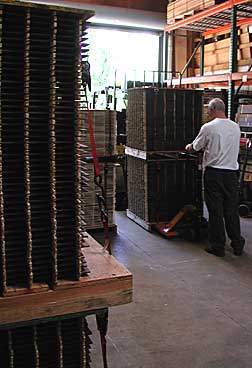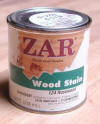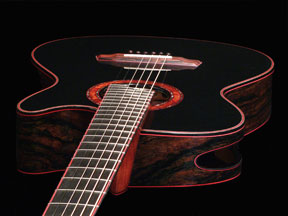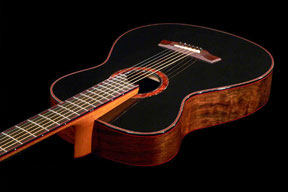EXTREME MAKE-OVER
HOME ORDER ONLINE PRODUCTS REGISTER CONTACT US

Give me medium grade to low grade wood. Wood is God's work and can't be improved upon. I want people to look at my work. —Classic guitarbuilder Eugene Clark.
Cameron readies a stack of rosewood for the kiln
INDIAN ROSEWOOD
"Opportunity" grade Indian rosewood.
It's an opportunity for you to test your mettle in staining and finishing, an opportunity to save a lot of money, and an opportunity for us to move Indian rosewood that we've accumulated for some factory customers:
We took a trip to our local ACE Hardware store and picked up a can of "rosewood" oil stain. After sanding a variety of lower grade, drab, or mineral laden rosewood backs, we quickly wiped a coat of this "nothing-special-stain" on a half of each back and stood back to admire our handy-work. We were happily surprised, both by how easy and fast it was and how quickly it turned some boring or normally problematic rosewood into something looking almost more exotic than high-grade Indian.
Extreme Makeover
There are several thumbnails that follow. Click on them to see the results. Some of the coarser-grained wood, after a stain application, ended up looking like some of the more exotic rosewoods we've seen, including some of the Macassar ebony and Malaysian blackwood varieties.
\
Above, coffee estate Indian rosewood is often grayish and drab. Just a little wipe on-wipe off effort with a stain of your choice and voilá, exotic Indian rosewood with a capital "I."
Please click on the thumbnails below for examples of the transformative powers of Zar. These are book-matches, one side treated the other side only sanded.
This was the oil stain offered by our local Ace Hardware store.
Above and below: uninspiring, dull, lifeless rosewood with very little effort becomes "wowser" wood. Note that this was fine sanded (320 grit), which tends to also improve the looks of this dull, lifeless wood.
Above and below: some of the darkest Indian rosewood often sports mineral deposits. The oil stain is soaked right up, and it's completely disguised. If you prefer not to stain the wood, you can use a mineral based pore filler to accomplish the same thing. A couple of other comments on dealing with mineral. The story is that the Martin company dealt with mineral using muriatic acid (we've tried it, a hassle, but it works), and we also heard that lemon juice works well (we haven't tried it). Also, acetone can be used to color the mineral by leeching out the resin from the surrounding wood which is then transferred to the mineral.
Above and below: color anomolies can be evened out or enhanced—beauty marks!
Extreme Makeover II Our factory grades include some beautiful forest wood (as opposed to coffee estate wood), with a few wormholes, or bark inclusions, or other defects that are very easily repaired in a matter of minutes. See our article on filling holes by clicking here.
Another take on filling holes is offered by local builder Taku Sakashita, who often fills a hole with a color in contrast to the wood, his way of highlighting nature's work. Below are thumbnails (click to enlarge), which offer a few unusual possibilities, such as is offered in our friend Charles Fox's Ergo guitar, but substitute the "painted" top for "painted" back and sides. (Below)
The sets will be dry, skim sanded, and pretty well matched. They will run the range in terms of repairable defects, mineral, bland color, and dark color. A coarser grained, bland colored set may have nothing wrong with it structurally, or perhaps some very small pin holes, while a dark forest wood set might have mineral or a solid knot. For the forest-wood sets, back and side matches will be as close as we can get them, but forest-wood backs are more plentiful than sides.
N.B. Shipping charges for 10 sets and over, will be charged at actual rates.
Address General Information Sales/support Telephone:
707-431-3760 POB 217, 101 C Grant Avenue, Healdsburg, Ca. 95448 USA [email protected] [email protected] Fax:
707-431-3762















